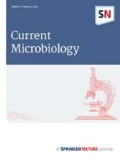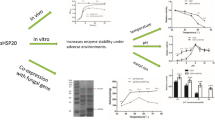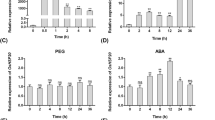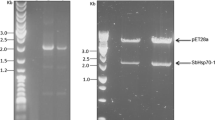Abstract
A gene encoding the rice (Oryza sativa L.) 90-kDa heat shock protein (OsHsp90) was introduced into Escherichia coli using the pGEX-6p-3 expression vector with a glutathione-S-transferase (GST) tag to analyze the possible function of this protein under heat stress for the first time. We compared the survivability of E. coli (BL21) cells transformed with a recombinant plasmid containing GST-OsHsp90 fusion protein with control E. coli cells transformed with the plasmid containing GST and the wild type BL21 under heat shock after isopropyl β-d-thiogalactopyranoside induction. Cells expressing GST-OsHsp90 demonstrated thermotolerance at 42, 50, and 70°C, treatments that were more harmful to cells expressing GST and the wild type. Further studies were carried out to analyze the heat-induced characteristics of OsHsp90 at 42, 50, and 70°C in vitro. When cell lysates from E. coli transformants were heated at these heat stresses, expressed GST-OsHsp90 prevented the denaturation of bacterial proteins treated with 42°C heat shocks, and partially prevented that of proteins treated at 50 and 70°C; meanwhile, cells expressing GST-OsHsp90 withstood the duration at 50°C. These results indicate that OsHsp90 functioned as a chaperone, binding to a subset of substrates, and maintained E. coli growth well at high temperatures.



Similar content being viewed by others
References
Bardwell JCA, Craig EA (1988) Ancient heat shock gene is dispensable. J Bacteriol 7:2977–2983
Borkovich KA, Farrelly FW, Finkelstein DB, Taulien J, Lindquist S (1989) Hsp82 is an essential protein that is required in higher concentrations for growth of cells at higher temperatures. Mol Cell Biol 9:3919–3930
Chu LF, Lee WC, Yang PC, Chu R, Huang TY, Mao SJ (1997) One-step HPLC purification procedure for porcine brain 90-kDa heat shock protein. Protein Expr Purif 10:180–184
Kimura Y, Matsumoto S, Yahara I (1994) Temperature-sensitive mutants of hsp82 of the budding yeast Saccharomyces cerevisiae. Mol Gen Genet 242:517–527
Krishna P, Reddy RK, Sacco M, Frappier RH, Felsheim RF (1997) Analysis of the native forms of the 90 kDa heat shock protein (hsp90) in plant cytosolic extracts. Plant Mol Biol 33:457–466
Larreta R, Soto M, Alonso C, Requena JM (2000) Leishmania infantum: gene cloning of the GRP94 homologue, its expression as recombinant protein, and analysis of antigencity. Exp Parasitol 96:108–115
Liu D, Zhang X, Cheng Y, Takano T, Liu S (2006) rHsp90 gene expression in response to several environmental stresses in rice (Oryza sativa L.). Plant Physiol Biochem 44:380–386
Marrs KAE, Casey S, Capitant SA, Bouchard RA, Dietrich PS, Mettler IJ, Sinibaldi R (1993) Characterization of two maize hsp90 heat shock protein genes and expression during heat shock, embryogenesis, and pollen development. Dev Genet 14:27–41
Park M, Kang CY, Krishna P (1998) Brassica napus hsp90 can autophosphorylate and phosphorylate other protein substrates. Mol Cell Biol 185:33–38
Pratt WB (1997) The role of Hsp90-based chaperone system in signal transduction by nuclear receptors and receptors signaling via MAP kinase. Annu Rev Pharmacol Toxicol 37:297–326
Reddy RK, Chaudhary S, Patil P, Krishna P (1998) The 90 kDa heat shock protein (hsp90) is expressed throughout Brassica napus seed development and germination. Plant Sci 131:131–137
Sanchez ER, Housley PR, Pratt WB (1986) The molybate-stabilized glucocorticoid binding complex of L-cells contains a 98–100 Kdalton steroid binding phosphoprotein and a 90 Kdalton nonsteroid-binding phosphoprotein that is part of the murine heat-shock complex. J Steroid Biochem 24:9–18
Schöffl F, Prändl R, Reindl A (1998) Regulation of the heat-shock response. Plant Physiol 117:1135–1141
Schroder H, Langer T, Hartl FU, Bukau B (1993) DnaK, DnaJ and GrpE form a cellular chaperone machinery capable of repairing heat-induced protein damage. EMBO J 12:4137–4144
Tanaka N, Nakamoto H (1999) HtpG is essential for the thermal stress management in cyanobacteria. FEBS Lett 458:117–123
Thomas JG, Baneyx F (1998) Roles of the Escherichia coli small heat shock proteins IbpA and IbpB in thermal stress management: comparison with CIpA, CIpB, and HtpG in vivo. J Bacteriol 180:5165–5172
Wiech H, Buchner J, Zimmermann R, Jakob U (1992) Hsp90 chaperones protein folding in vitro. Nature 358:169–170
Acknowledgments
This work was supported by the Excellent Teachers Program Foundation of Heilongjiang University (QL200729) and the Heilongjiang Province Postdoctoral Science Foundation (LBH-Z07029).
Author information
Authors and Affiliations
Corresponding author
Rights and permissions
About this article
Cite this article
Liu, D., Lu, Z., Mao, Z. et al. Enhanced Thermotolerance of E. coli by Expressed OsHsp90 from Rice (Oryza sativa L.). Curr Microbiol 58, 129–133 (2009). https://doi.org/10.1007/s00284-008-9288-4
Received:
Accepted:
Published:
Issue Date:
DOI: https://doi.org/10.1007/s00284-008-9288-4




